Related Research Articles

James Gordon Brown is a British politician who served as Prime Minister of the United Kingdom and Leader of the Labour Party from 2007 to 2010. He served as Chancellor of the Exchequer in the Blair government from 1997 to 2007. Brown was a Member of Parliament (MP) from 1983 to 2015, first for Dunfermline East and later for Kirkcaldy and Cowdenbeath. He is the most recent Labour politician and most recent Scottish politician to hold the office of Prime Minister.

New Labour is a period in the history of the British Labour Party from the mid to late 1990s until 2010 under the leadership of Tony Blair and Gordon Brown. The name dates from a conference slogan first used by the party in 1994, later seen in a draft manifesto which was published in 1996 and titled New Labour, New Life for Britain. It was presented as the brand of a newly reformed party that had altered Clause IV and endorsed market economics. The branding was extensively used while the party was in government between 1997 and 2010. New Labour was influenced by the political thinking of Anthony Crosland and the leadership of Blair and Brown as well as Peter Mandelson and Alastair Campbell's media campaigning. The political philosophy of New Labour was influenced by the party's development of Anthony Giddens' Third Way which attempted to provide a synthesis between capitalism and socialism. Mark Bevir argues that another motivation for the creation of New Labour was as a response to the emergence of the New Right in the preceding decades. The party emphasised the importance of social justice, rather than equality, emphasising the need for equality of opportunity and believed in the use of markets to deliver economic efficiency and social justice.
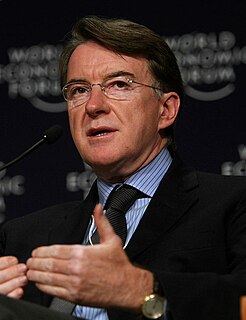
Peter Benjamin Mandelson, Baron Mandelson is a British Labour politician who served as First Secretary of State from 2009 to 2010. A member of the Labour Party, he was President of the Board of Trade in 1998 and from 2008 to 2010. He is the president of international think tank Policy Network, honorary president of the Great Britain–China Centre, and chairman of strategic advisory firm Global Counsel.
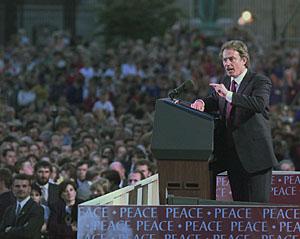
In British politics, Blairism is the political ideology of the former leader of the Labour Party and Prime Minister Tony Blair and those that follow him. It entered the New Penguin English Dictionary in 2000. Proponents of Blairism are referred to as Blairites.

Jon Hedley Trickett is a British Labour politician who has been the Member of Parliament (MP) for Hemsworth in West Yorkshire since a 1996 by-election. He was Shadow Lord President of the Council from 2016 to 2020 and served as Shadow Minister for the Cabinet Office from 2011 to 2013 and 2017 to 2020. He was the Labour Party National Campaign Coordinator under Jeremy Corbyn from 2015 to 2017.

Edward Samuel Miliband is a British politician serving as Shadow Secretary of State for Business, Energy and Industrial Strategy since 2020, and has served as Member of Parliament (MP) for Doncaster North since 2005. He was previously Leader of the Labour Party and the Leader of the Opposition between 2010 and 2015, resigning after Labour's defeat at the 2015 general election. Alongside his brother, Foreign Secretary David Miliband, he served in the Cabinet from 2007 to 2010 under Prime Minister Gordon Brown.

Ogilvy is a New York City-based British advertising, marketing, and public relations agency. It was founded in 1850 by Edmund Mather as a London-based agency. In 1964, the firm became known as Ogilvy & Mather after merging with a New York City agency that was founded in 1948 by David Ogilvy. The agency is now part of the WPP Group, one of the largest advertising and public relations companies in the world. The company provides services in six areas: brand strategy, advertising, customer engagement and commerce, public relations and influence, digital transformation, and partnerships. The company's strategy division OgilvyRED became Ogilvy Consulting.

Patrick Bosco McFadden is a British politician who has been Member of Parliament (MP) for Wolverhampton South East since 2005. A member of the Labour Party, he was briefly Shadow Secretary of State for Business, Innovation and Skills in 2010 and Shadow Minister for Europe from 2014 to 2016 under Ed Miliband and Jeremy Corbyn.

The Andrew Marr Show is BBC One's flagship Sunday morning talk show presented by Andrew Marr, previously the BBC's political editor. It replaced the long-running Breakfast with Frost programme when David Frost decided to retire in 2005.
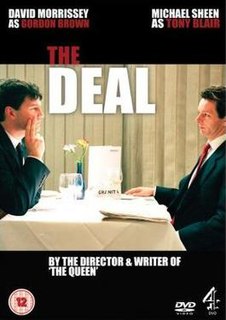
The Deal is a 2003 British television film that depicts the Blair-Brown deal—a well-documented pact that Tony Blair and Gordon Brown made whereby Brown would not stand in the 1994 Labour leadership election, so that Blair could have a clear run at becoming leader of the party and later as Prime Minister instead. The film begins in 1983, as Blair and Brown are first elected to Parliament, and ended in 1994 at the Granita restaurant—the location of the supposed agreement—with a brief epilogue following the leadership contest.

Steve Hilton is a British political commentator and former political adviser. He served as director of strategy for the British Prime Minister David Cameron from 2010 to 2012. Since 2017, Hilton has hosted The Next Revolution, a weekly current affairs show for Fox News. He is a proponent of what he calls "positive populism" and a vocal supporter of U.S. President Donald Trump. He is a co-founder of Crowdpac.

The premiership of Gordon Brown began on 27 June 2007 when Brown accepted the Queen's invitation to form a new administration, replacing Tony Blair as the Prime Minister of the United Kingdom. It ended with his resignation as Prime Minister on 11 May 2010. While serving as Prime Minister, Brown also served as the First Lord of the Treasury, the Minister for the Civil Service and the Leader of the Labour Party. He was succeeded as Prime Minister by David Cameron after the 2010 general election.
Spencer Elliot Livermore, Baron Livermore is a strategy and communications professional. He has advised clients in North America, the Middle East, Europe and Asia, on formulating and articulating strategy, as Director of Strategy at London-based communications consultancy Blue Rubicon - where he built and had Board responsibility for their Strategic Consulting division - and as Senior Strategist at advertising agency Saatchi & Saatchi.
Benjamin Wegg-Prosser is managing partner of Global Counsel, a London-based strategic consultancy which has as its chair Peter Mandelson. Wegg-Prosser was Tony Blair's Director of Strategic Communications at 10 Downing Street.
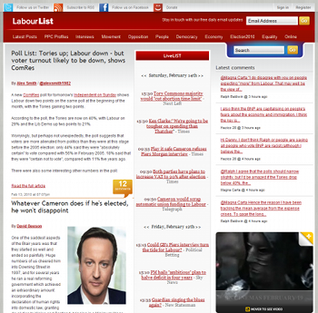
LabourList is a British news website supportive of, but independent of, the Labour Party, launched in 2009. Describing itself as Labour's "biggest independent grassroots e-network", the site's content includes news, commentary, interviews, campaign information, analysis and opinion from various contributors and sources across the Labour and trade union movement. It is funded by trade unions, adverts, and individual donors. LabourList started as a weblog with reader comments, but in February 2019 the ability for readers to write comments was removed.
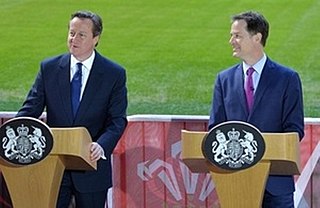
The Cameron–Clegg coalition was formed by David Cameron and Nick Clegg when Cameron was invited by Queen Elizabeth II to form a new administration, following the resignation of Prime Minister Gordon Brown on 11 May 2010, after the general election on 6 May. It was the UK's first coalition government since the Churchill caretaker ministry in 1945. The coalition was led by Cameron as Prime Minister with Clegg as Deputy Prime Minister and composed of members of both Cameron's Centre-right Conservative Party and Clegg's Centrist Liberal Democrats.

The events surrounding the formation of the United Kingdom's government in 2010 took place between 7 May and 12 May 2010, following the 2010 general election, which failed to produce an overall majority for any of the country's two main political parties. The election, held on 6 May, resulted in the first hung parliament in the UK in 36 years, sparking a series of negotiations which would form the first coalition government since the Second World War.
"One more heave" was a slogan used by British Liberal Party leader Jeremy Thorpe during the October 1974 general election and a phrase used to describe the political strategy of John Smith, leader of the Labour Party from July 1992 until his death in May 1994.
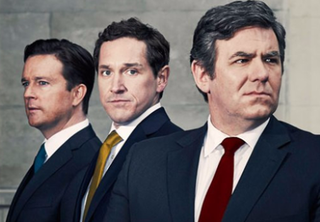
Coalition is a 2015 British television film about the formation of a coalition government following the 2010 United Kingdom general election. It was broadcast on Channel 4 on 28 March 2015, shortly before that year's general election. The film was written by James Graham and starred Bertie Carvel as Nick Clegg, Ian Grieve as Gordon Brown, and Mark Dexter as David Cameron. Graham wrote the film in the aim of giving humanity and enabling empathy to all of the figures portrayed within it, which earned it positive reviews from critics.
Roland Dacre Rudd is the founder and chairman of Finsbury, a public relations firm. Rudd was educated at Oxford University, becoming President of the Oxford Union before starting a career in journalism that he left to found Finsbury. He sold that company to WPP plc in 2001, making an estimated £40 million.
References
- ↑ John Tylee (28 January 2005). "Muir takes over at The Channel - advertising news - Campaign". Campaignlive.co.uk. Retrieved 26 May 2011.
- ↑ "Millward Brown Optimor's Valuation of Brands - Ritson on Brand - Blogs - Brand Republic". Community.brandrepublic.com. Retrieved 26 May 2011.
- ↑ "sports specialist companies launch global sports brands study: SportZ". WPP. 11 March 2003. Retrieved 26 May 2011.
- ↑ "Team Brown strengthens". The Spectator. Archived from the original on 4 February 2012. Retrieved 26 May 2011.
- ↑ "UK | UK Politics | No time for a novice, says Brown". BBC News. 23 September 2008. Retrieved 26 May 2011.
- ↑ Archived 13 May 2009 at the Wayback Machine
- ↑
- ↑ Patrick Wintour, political editor (15 July 2010). "Peter Mandelson on Brown: 'We were in a pit of debt. And we kept on digging' | Politics". The Guardian. London. Retrieved 26 May 2011.
- ↑ Patrick Wintour, political editor (18 May 2010). "Gordon Brown tried to announce resignation before election | Politics". The Guardian. London. Retrieved 26 May 2011.